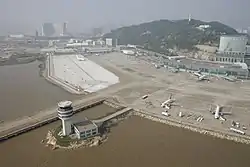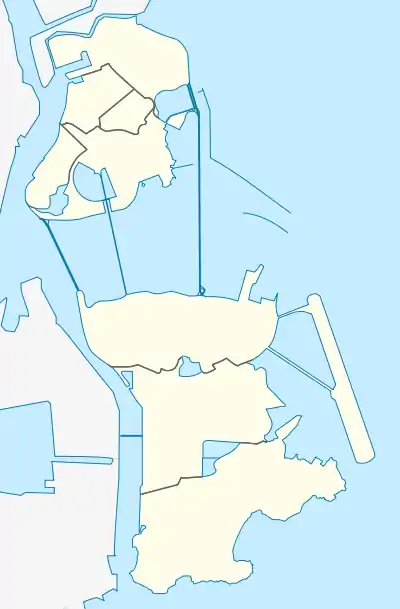Macau International Airport
Macau International Airport (IATA: MFM, ICAO: VMMC) (Chinese: 澳門國際機場; Portuguese: Aeroporto Internacional de Macau) is an international airport in the special administrative region of Macau, situated at the eastern end of Taipa island and neighbouring waters which opened for commercial operations on 9 November 1995, during Portuguese administration of the region.
Macau International Airport Aeroporto Internacional de Macau 澳門國際機場 Oumùhn Gwokjai Gēichèuhng | |||||||||||
|---|---|---|---|---|---|---|---|---|---|---|---|
 | |||||||||||
 | |||||||||||
| Summary | |||||||||||
| Airport type | Public | ||||||||||
| Owner | Government of Macau | ||||||||||
| Operator | Sociedade do Aeroporto Internacional de Macau S.A.R.L. | ||||||||||
| Serves | Pearl River Delta | ||||||||||
| Location | Taipa, Macau | ||||||||||
| Opened | 9 November 1995 | ||||||||||
| Hub for | Air Macau | ||||||||||
| Elevation AMSL | 6 m / 20 ft | ||||||||||
| Coordinates | 22°08′58″N 113°35′29″E | ||||||||||
| Website | www | ||||||||||
| Map | |||||||||||
 MFM Location in Macau | |||||||||||
| Runways | |||||||||||
| |||||||||||
| Statistics (2022) | |||||||||||
| |||||||||||
| Macau International Airport | |||||||||||||||
|---|---|---|---|---|---|---|---|---|---|---|---|---|---|---|---|
| Chinese name | |||||||||||||||
| Traditional Chinese | 澳門國際機場 | ||||||||||||||
| Simplified Chinese | 澳门国际机场 | ||||||||||||||
| Cantonese Yale | Oumùhn Gwokjai Gēichèuhng | ||||||||||||||
| |||||||||||||||
| Portuguese name | |||||||||||||||
| Portuguese | Aeroporto Internacional de Macau | ||||||||||||||
| Economy of Macau |
|---|
 |
| Currency and identity |
| Resources |
| Companies |
| Other Macau topics |
Since then the airport has been a common transfer point for people traveling between the Mainland and Taiwan, as well as a passenger hub for destinations in mainland China and Southeast Asia. During 2006, the airport handled 5 million passengers and 220,000 tonnes of cargo.[3] In 2017 the number of passengers had increased to 7,165,803,[4] which is more than the 6 million passengers per year the terminal was originally designed for.[5]
History
The Macau airport was constructed on reclaimed land adjacent to the islands of Taipa and Coloane.[6] It cost US$1 billion to build. Commercial air service began on 9 November 1995. The first departure was an Air Macau flight to Beijing, and the first arrival was a Malaysia Airlines flight from Kuala Lumpur.[7] The official inauguration ceremony took place on 8 December 1995, and Portuguese President Mário Soares presided over it.[6]
In April 1996, TAP Air Portugal started service to Lisbon using Airbus A340s.[8][9] It cooperated with Sabena on the route; the flight stopped in Brussels, and TAP allocated a certain number of seats to the airline on the segment between Brussels and Macau. TAP encountered difficulties in running the flights. The crew had to spend long layovers in Macau because the service only operated twice a week. Additionally, TAP and Air Macau, in which the former held a stake, were unable to coordinate their schedules, making connections between the Lisbon flight and Air Macau's network inconvenient.[9] In April 1997, TAP moved the stopover to Bangkok in hopes of attracting more passengers.[10][11] Nevertheless, it was losing money on the route. The company's chairman stated in November 1997 that he wanted to end the link but that he faced opposition from the Portuguese government, which owned the airline.[12] TAP stopped serving Macau the following year.[13]
Facilities
Terminal
The airport's designed capacity is 6,000,000 passengers per year, with processing capacity of up to 2,000 passengers per hour. The airport does not have a night curfew. There are 24 parking spaces for aircraft in the apron, with five jetways. There are 10 gates. As in Hong Kong, Macau has its own immigration policies and is a separate customs territory from mainland China. All travellers, including those to mainland China and Hong Kong, need to go through the immigration and customs inspections of international flights.
Runway and aprons
The airport's runway was built on a strip of reclaimed land in the sea, adjacent to Taipa Island, where the main terminal and air traffic control facilities are located, unlike in Hong Kong, where Chek Lap Kok has them all on a reclaimed island. The runway is connected to the apron by two causeways. Runway 34 is ILS CAT II equipped. Navigational and radio aids are located at either end of the runway. Despite its small area, the airport is capable of handling Boeing 747s and Antonov 124s, which forms a vital freight link between local manufacturers and overseas markets. Its catering facility can produce up to 10,000 meals per day.
Other tenants
Other tenants of the airport are the Macau Customs Service (Independent department under Secretariat for Security of Macau), the Macau Immigration Department/Services (Public Security Police Force of Macau), the Macau Business Aviation Centre, Servair Macau and Menzies Macau.
Redevelopment
Since 2016, Macau's government has been developing a master plan for the airport's expansion.[14] To be done in three phases, the most visible sections of it broke ground in 2020.[15]
Airlines and destinations
Statistics
Annual traffic
| Year | Passengers[20][21][1] | Airfreight (kg)[22][23][2] | Aircraft operations[1] |
|---|---|---|---|
| 2012 | 4,491,065 | 27,794,488 | 41,997 |
| 2013 | 5,027,059 | 26,464,881 | 48,950 |
| 2014 | 5,481,441 | 28,767,407 | 52,559 |
| 2015 | 5,831,459 | 30,058,277 | 55,720 |
| 2016 | 6,628,555 | 32,891,452 | 56,932 |
| 2017 | 7,165,803 | 37,499,000 | 58,520 |
| 2018 | 8,261,412 | 41,508,955 | 65,777 |
| 2019 | 9,611,427 | 42,219,799 | 77,581 |
| 2020 | 1,173,231 | 33,346,677 | 16,962 |
| 2021 | 1,147,015 | 48,595,307 | 15,791 |
| 2022 | 599,185 | 51,400,662 | 13,642 |
Ground transportation
The airport is connected by public transit bus routes, light rail, taxis, private cars, and regional coach services.
Air–sea link
For passengers transferring to China or Hong Kong, a "two customs, one checkpoint" service is provided. Passengers can use a bus shuttle directly from the airport to the New Macau Ferry Terminal or the Taipa Ferry Terminal without passing Macau immigration.
Bus
Towards Macau Peninsula, Taipa, Cotai and Coloane
- Transmac routes:
- 26 – Bacia Norte do Patane ↔ Mercado Municipal de Coloane
- 51A – The Praia ↔ Av. Vale das Borboletas
- AP1 – Portas do Cerco ↺ Aeroporto de Macau
- AP1X – Praça das Portas do Cerco ↺ Aeroporto de Macau (06:00–10:00, 15:00–20:00)
- MT4 – Parque M. Dr. Sun Yat Sen ↔ Terminal Marítimo de Passageiros da Taipa
- T.C.M. routes:
- N2 – Bacia Norte do Patane ↔ Terminal Marítimo de Passageiros da Taipa (00:00–06:00)
- 36 – Rotunda Leonel Sousa ↺ Aeroporto de Macau
- MT1 – Praceta 24 de Junho ↺ Aeroporto de Macau
Cross-border coaches
Cross-border coaches connect Macau International Airport with mainland locations like Huadao, Guangzhou, Panyu, Dongguan, Gongbei Port of Entry and Hengqin Border. The "two customs, one checkpoint" service is also available at the Hengqin Border.
Light rail
The airport is served by the Airport Station of the Macau Light Rail Transit's Taipa Line at Avenida Wai Long.[24]
References
- "Traffic Statistics – Passengers". CAM – Macau International Airport Co. Ltd. Retrieved 24 January 2023.
- "Traffic Statistics – Cargo". CAM – Macau International Airport Co. Ltd. Retrieved 24 January 2023.
- Macao 2007 Yearbook (PDF). Government Information Bureau of the Macau SAR. 2007. ISBN 978-99937-56-09-5.
- "Traffic Statistics – Passengers". Macau International Airport Co. Ltd. Retrieved 20 March 2020.
- "MIA: Airport History". Airport Information Management Solutions Ltd. Retrieved 18 February 2018.
- Menon, Vijayan (9 December 1995). "Macau Airport built on reclaimed land opens". New Straits Times. ProQuest 269071286.
- Ionides, Nicholas (10 November 1995). "Absence of facilities at Macau airport 'normal'". South China Morning Post. ProQuest 265265309.
- "Route developments". World Airline News. 5 February 1996. ProQuest 195017579.
- Whitaker, Richard (31 July 1996). "TAP trickles into Macau". Airline Business. Retrieved 2 June 2021.
- "Macau's airport gamble". South China Morning Post. 19 June 1997. Retrieved 26 February 2023.
- Tansubhapol, Bhanravee (9 April 1997). "Aviation - Direct Flight to Portugal Makes Debut". Bangkok Post.
- "Turn off the TAP". Airline Business. 30 November 1997. Retrieved 2 June 2021.
- Lo, Joseph (13 September 2002). "Buyer in sight for Air Macau stake". South China Morning Post. Retrieved 26 February 2023.
- "Macau International Airport Master Plan". Civil Aviation Authority of Macao. Retrieved 27 April 2020.
- "Macau Airport Begins Construction". International Airport Review. 16 March 2020.
- "AIR MACAU ADDS JAKARTA SERVICE FROM LATE-OCT 2023". Aeroroutes. Retrieved 16 October 2023.
- "China Eastern Resumes Xi'An – Hong Kong / Macau Service in NW23". Aeroroutes. Retrieved 26 October 2023.
- "제주항공, 11월 10일부터 인천∼마카오 매일 재운항". 연합뉴스. Retrieved 25 September 2023.
- "Thai Lion Air Adds Macau Service From mid-Oct 2023". Aeroroutes. Retrieved 15 September 2023.
- "Traffic Statistics – Passengers, retrieved March 5, 2015". Archived from the original on 6 October 2014. Retrieved 29 October 2017.
- "CAM :: Traffic Statistics – Passengers". www.camacau.com. Archived from the original on 9 May 2017. Retrieved 24 February 2016.
- "Traffic Statistics – Cargo, retrieved March 5, 2015". Archived from the original on 20 September 2013. Retrieved 29 October 2017.
- "CAM :: Traffic Statistics – Cargo". www.camacau.com. Archived from the original on 11 October 2017. Retrieved 24 February 2016.
- "Airport Station". Macao Light Rapid Transit Corporation, Limited. Retrieved 15 December 2022.
External links
![]() Media related to Macau International Airport at Wikimedia Commons
Media related to Macau International Airport at Wikimedia Commons